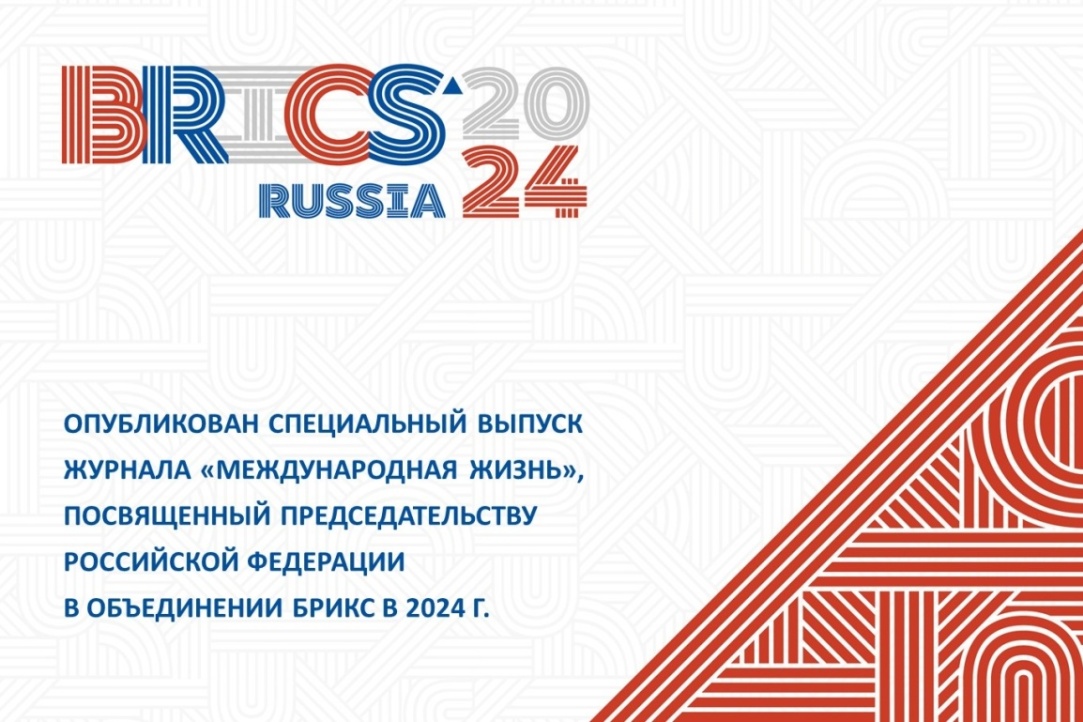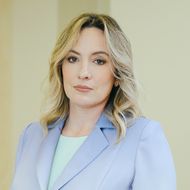Victoria Panova: "The Future Lies with BRICS, and BRICS Encompasses All of Us"
Victoria Panova, Head of the BRICS Expert Council-Russia, Candidate of Sciences (PhD) in History, and Vice Rector at HSE University contributed an insightful article to a special edition of the International Affairs magazine. This edition is dedicated to Russia's BRICS Chairship in 2024.

The publication also features an address by Sergey Lavrov, Minister of Foreign Affairs of the Russian Federation, and an interview with Sergey Ryabkov, Deputy Minister of Foreign Affairs of Russia and Russia’s Sherpa in BRICS, along with contributions from top officials at various Russian ministries, government agencies, and representatives from the academic, civil, and business communities.
In her article for the special edition of International Affairs, Victoria Panova explores the factors behind the growing appeal of BRICS, which has led around 30 countries to express their interest in joining the group in 2024. She highlights several key reasons for this surge in interest, including the principle of sovereign equality and mutual respect within the group and towards other nations, which contrasts with the assertion of moral superiority often made by other global powers. Ms. Panova also emphasizes BRICS' focus on dialogue and finding mutually acceptable solutions to complex issues, rather than imposing unilateral dictates and allowing countries the freedom to develop according to their own national aspirations, cultures, and traditions, rather than being constrained by the narrow interests of one or a few powerful nations. Additionally, she notes that BRICS values and promotes dialogue between civilisations, cultures, and religions instead of advocating standardisation and homogenisation that undermines individual identity. All of these factors make BRICS an attractive group for countries seeking to participate in shaping the global future on equal and respectful terms.

"It is this, rather than quantitative indicators of superiority such as aggregate GDP in PPP or industrial output, that seems to make the BRICS more attractive to many countries than similar formats of Western states, and offers greater opportunities for unification in addressing the challenges of reforming the international system towards greater representativeness and fairness of regulatory principles. BRICS is now in a position to give a voice and a chance to the states that have traditionally been on the periphery of the international system to choose the main parameters of their future, and this opportunity is not only available to those who are officially members of the Group," Victoria Panova notes, pointing out with regret that the absence of dialogue among the representatives of the so-called 'Golden Billion' effectively paralyzes the functioning of all global institutions. "Even areas such as culture, science, or sports, which should serve to unite and transcend politics, are being politicized and exploited by Western states," the expert adds.
In her article, HSE University’s Vice Rector and Russian W20 Sherpa provides insights into the origins of the BRICS Civil Forum, which was initiated by Russia in 2015. She delves into the broader BRICS framework, highlighting its unique approach: "Since its inception, BRICS has functioned as a comprehensive initiative, rather than simply a forum for leaders to debate economic issues. It gathers not only like-minded people but also enthusiasts. Significantly, the innovative aspect of this unique format stems from its grassroots origins. Although the formal first BRICS summit took place in 2009, a year earlier, a gathering of BRICS intellectuals took place at the initiative of Vyacheslav Nikonov. This intellectual exchange was a precursor to the official process, which does not undermine the significant role of other initiatives, such as the Primakov doctrine of the triangle and discussions within the Heiligendamm Process, along with subsequent official meetings held at the UN."
When discussing the prospects for further development, Victoria Panova highlights the crucial role of expert capacity and intellectual foresight within BRICS: "many significant BRICS initiatives originated in the debates and discussions of experts." She underscores that "this does not mean that we should not revisit and rethink the idea today. This could allow the BRICS countries to create their own strong analytical centre, similar to the OECD. Such a centre could combine analytical and research resources," but also rely on AI, which would conduct periodic optimization of existing projects and documents, as well as provide a technological platform for interaction between BRICS national coordinators.
"The functionality of a platform that includes independent but interconnected national segments can be significantly expanded. With a shared umbrella, individual sectors can be dedicated to various outreach formats, including the expert track (e.g., BRICS Business Council and Women's Business Alliance), youth and parliamentary tracks, civil society organizations, and STI." This platform could provide much greater transparency to the business communities and young people from the BRICS countries by offering a verified roster of participants from member states.
Victoria Panova further elaborates on the need for alternative strategies and tools to reshape the global system of international relations, emphasizing the importance of renewing institutions and generating new, mutually beneficial ideas.
Head of the BRICS Expert Council emphasizes that BRICS does not aim to position itself in opposition to the West: "However, given the increasingly assertive position of the West, despite the BRICS stance of not being against anyone, the likelihood of the West versus the rest concept being put into practice is increasing. In this context, the role of BRICS is not only to create and nurture a space of trust and cooperation among the countries of the World Majority but also to mitigate the potential negative consequences for global development and for the citizens of all countries, including Western nations, resulting from the aggressive policies of the global Western elites."
Reflecting on the history of G7, Ms Panova recalls how Russia once aspired to join this 'club for the chosen few'. "Once, Russia earnestly sought to join this group by completing all required tasks and trying to please the established members. However, as national pride was restored and the importance of sovereignty recognized, it became clear that Russia's interests did not align with the group's goals or the broader global development agenda," Ms Panova notes, adding that "the future lies with BRICS, and BRICS encompasses all of us."
